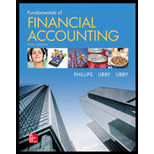
Fundamentals of Financial Accounting
5th Edition
ISBN: 9780078025914
Author: Fred Phillips Associate Professor, Robert Libby, Patricia Libby
Publisher: McGraw-Hill Education
expand_more
expand_more
format_list_bulleted
Concept explainers
Textbook Question
Chapter 8, Problem 9Q
What are the three components of the interest formula? Explain how this formula adjusts for interest periods that are less than a full year.
Expert Solution & Answer
Want to see the full answer?
Check out a sample textbook solution
Students have asked these similar questions
Multiple Choice 2-32
Educational Incentives (LO 2.14)
Wendy is a single taxpayer and pays tuition of $7,800 in 2021. Her 2021 AGI is $66,000. What is the amount of Wendy's tuition deduction?
X a. $2,000
O b. $0
O c. $3,733.33
O d. $4,000
O e. $7,800
Multiple Choice 2-32
Educational Incentives (LO 2.14)
Wendy is a single taxpayer and pays tuition of $7,800 in 2021. Her 2021 AGI is $66,000. What is the amount of Wendy's tuition deduction?
X a. $2,000
O b. $0
O c. $3,733.33
O d. $4,000
O e. $7,800
None
Chapter 8 Solutions
Fundamentals of Financial Accounting
Ch. 8 - What are the advantages and disadvantages of...Ch. 8 - Prob. 2QCh. 8 - Which basic accounting principles does the...Ch. 8 - Using the allowance method, is Bad Debt Expense...Ch. 8 - What is the effect of the write-off of...Ch. 8 - How does the use of calculated estimates differ...Ch. 8 - Prob. 7QCh. 8 - What is the primary difference between accounts...Ch. 8 - What are the three components of the interest...Ch. 8 - Prob. 10Q
Ch. 8 - Does an increase in the receivables turnover ratio...Ch. 8 - What two approaches can managers take to speed up...Ch. 8 - When customers experience economic difficulties,...Ch. 8 - (Supplement 8A) Describe how (and when) the direct...Ch. 8 - (Supplement 8A) Refer to question 7. What amounts...Ch. 8 - 1. When a company using the allowance method...Ch. 8 - 2. When using the allowance method, as Bad Debt...Ch. 8 - 3. For many years, Carefree Company has estimated...Ch. 8 - 4. Which of the following best describes the...Ch. 8 - 5. If the Allowance for Doubtful Accounts opened...Ch. 8 - 6. When an account receivable is recovered a....Ch. 8 - Prob. 7MCCh. 8 - 8. If the receivables turnover ratio decreased...Ch. 8 - Prob. 9MCCh. 8 - Prob. 10MCCh. 8 - Prob. 8.1MECh. 8 - Evaluating the Decision to Extend Credit Last...Ch. 8 - Prob. 8.3MECh. 8 - Prob. 8.4MECh. 8 - Recording Write-Offs and Bad Debt Expense Using...Ch. 8 - Determining Financial Statement Effects of...Ch. 8 - Estimating Bad Debts Using the Percentage of...Ch. 8 - Estimating Bad Debts Using the Aging Method Assume...Ch. 8 - Recording Bad Debt Estimates Using the Two...Ch. 8 - Prob. 8.10MECh. 8 - Prob. 8.11MECh. 8 - Recording Note Receivable Transactions RecRoom...Ch. 8 - Prob. 8.13MECh. 8 - Determining the Effects of Credit Policy Changes...Ch. 8 - Prob. 8.15MECh. 8 - (Supplement 8A) Recording Write-Offs and Reporting...Ch. 8 - Recording Bad Debt Expense Estimates and...Ch. 8 - Determining Financial Statement Effects of Bad...Ch. 8 - Recording, Reporting, and Evaluating a Bad Debt...Ch. 8 - Recording Write-Offs and Recoveries Prior to...Ch. 8 - Prob. 8.5ECh. 8 - Computing Bad Debt Expense Using Aging of Accounts...Ch. 8 - Computing Bad Debt Expense Using Aging of Accounts...Ch. 8 - Recording and Reporting Allowance for Doubtful...Ch. 8 - Recording and Determining the Effects of Write-Off...Ch. 8 - Prob. 8.10ECh. 8 - Recording Note Receivable Transactions, Including...Ch. 8 - Recording Note Receivable Transactions, Including...Ch. 8 - Prob. 8.13ECh. 8 - Prob. 8.14ECh. 8 - Prob. 8.15ECh. 8 - Prob. 8.16ECh. 8 - (Supplement 8A) Recording Write-Offs and Reporting...Ch. 8 - Recording Accounts Receivable Transactions Using...Ch. 8 - Prob. 8.2CPCh. 8 - Recording Notes Receivable Transactions Jung ...Ch. 8 - Accounting for Accounts and Notes Receivable...Ch. 8 - Prob. 8.5CPCh. 8 - Recording Accounts Receivable Transactions Using...Ch. 8 - Prob. 8.2PACh. 8 - Prob. 8.3PACh. 8 - Accounting for Accounts and Notes Receivable...Ch. 8 - Analyzing Allowance for Doubtful Accounts,...Ch. 8 - Recording Accounts Receivable Transactions Using...Ch. 8 - Interpreting Disclosure of Allowance for Doubtful...Ch. 8 - Recording Notes Receivable Transactions Stinson...Ch. 8 - Accounting for Accounts and Notes Receivable...Ch. 8 - Prob. 8.5PBCh. 8 - Recording and Reporting Credit Sales and Bad Debts...Ch. 8 - Prob. 8.2COPCh. 8 - Recording Daily and Adjusting Entries Using FIFO...Ch. 8 - Prob. 8.1SDCCh. 8 - Comparing Financial Information Refer to the...Ch. 8 - Ethical Decision Making: A Real-Life Example You...Ch. 8 - Critical Thinking: Analyzing the Impact of Credit...Ch. 8 - Using an Aging Schedule to Estimate Bad Debts and...Ch. 8 - Accounting for Receivables and Uncollectible...
Knowledge Booster
Learn more about
Need a deep-dive on the concept behind this application? Look no further. Learn more about this topic, accounting and related others by exploring similar questions and additional content below.Similar questions
arrow_back_ios
SEE MORE QUESTIONS
arrow_forward_ios
Recommended textbooks for you
 Intermediate Accounting: Reporting And AnalysisAccountingISBN:9781337788281Author:James M. Wahlen, Jefferson P. Jones, Donald PagachPublisher:Cengage Learning
Intermediate Accounting: Reporting And AnalysisAccountingISBN:9781337788281Author:James M. Wahlen, Jefferson P. Jones, Donald PagachPublisher:Cengage Learning

Intermediate Accounting: Reporting And Analysis
Accounting
ISBN:9781337788281
Author:James M. Wahlen, Jefferson P. Jones, Donald Pagach
Publisher:Cengage Learning

What is a mortgage; Author: Kris Krohn;https://www.youtube.com/watch?v=CFjY-58ooi0;License: Standard YouTube License, CC-BY
Topic 10 Accounting for Liabilities Mortgage Payable; Author: Accounting Thinker;https://www.youtube.com/watch?v=EPJOphrbArM;License: Standard YouTube License, CC-BY